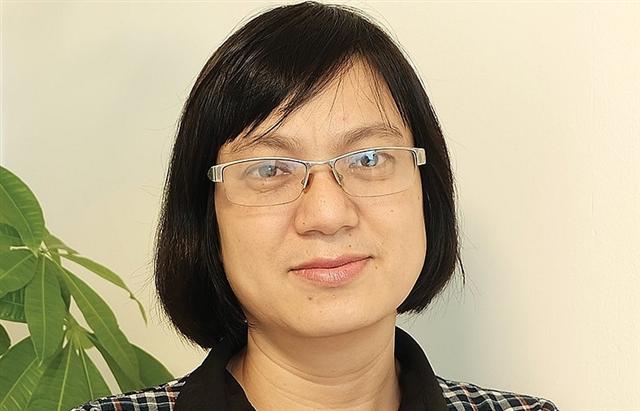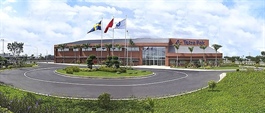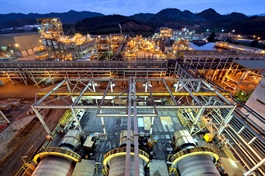Encouraging biomass energy to buttress turn to renewables
Encouraging biomass energy to buttress turn to renewables
Biomass has the potential to be a critical portion of Vietnam’s renewable change. Le Thi Thoa, senior officer of the Climate Protection through Sustainable Bioenergy Markets in Vietnam project under the GIZ Energy Support Programme, points out barriers for the sector and how GIZ provides support to meet its ambitious plan for biomass power in Vietnam.

Le Thi Thoa, senior officer of the Climate Protection through Sustainable Bioenergy Markets in Vietnam project under the GIZ Energy Support Programme.
|
What is the current development status of biomass energy in Vietnam?
As an agricultural country with favourable geographical conditions, Vietnam has a great potential for biomass which can be exploited for energy production. Biomass resources in the country include firewood, rice husks, coffee husks, straw, and bagasse. Though the potential is huge, only 350 gigawatt hours was produced from bagasse in 2019.
According to the revised Power Development Plan VII (PDP7) and Renewable Energy Development Strategy, Vietnam aims to raise the share of biomass energy in electricity production to 2.1 per cent by 2030 and 8.1 per cent by 2050. The revised PDP7 also sets the goal for biomass electricity production of 1,200MW and 3,000MW in 2025 and 2030.
In order to encourage biomass electricity projects to generate electricity from bagasse from sugar production for self-consumption and for the national power grid (if available), in 2014, the government issued a feed-in tariff (FiT) for biomass electricity projects. However, the tariff was not attractive enough to investors. Vietnam’s sugar industry development plan until 2020 with a vision to 2030 targeted the utilisation of the by-products of the sugarcane industry for electricity generation so as to raise the value added to the sugarcane industry’s value chain, and improve the efficiency of the industry’s production, business and competitive capacity.
To realise this, many sugar-producing firms have separated their electricity production from sugar production and made additional investment in new steam boilers to enhance the efficiency of bagasse-fired electricity production. According to a report by the National Load Dispatch Centre under Electricity of Vietnam, only 175MW of biomass electricity generated by three sugarcane factories were feeding in through 2019. Thus, biomass electricity has only achieved about 26.5 per cent of the 2020 goal.
What barriers do you see for biomass energy, including bagasse, as only a quarter of the 2020 target has been achieved?
To promote the development of biomass electricity projects, the revision of the FiT was necessary in accordance with Decision No.24/2014/QD-TTg on a support mechanism for biomass power projects.
Item 1, Article 14 of Decision 24 stipulated a 5.8 US cents per kilowatt hour FiT for bagasse-fired co-generation heat power projects. In 2014, in the calculation for bagasse-fired co-generation power projects, bagasse was considered a “redundant” material from sugarcane factories, while sugarcane factories were not required to develop their infrastructure for sugarcane production, or to buy bagasse as they could use it from sugarcane production itself. On the other hand, since their establishment, sugar-producing companies considered sugar their flagship. Therefore, these companies have invested in suitable machines to ensure their sugar products would meet market demand.
In order to achieve the goals set by Vietnam’s sugar industry development plan until 2020 with a vision to 2030 and the revised PDP7, it was important to adjust the FiT for biomass electricity to attract investors. The prime minister had issued Decision No.08/2020/QD-TTg dated March 5 amending and supplementing several articles of 2014’s Decision 24. The current FiT for co-generated biomass electricity sits at 7.03 US cents per kWh and 8.47 US cents for other types of biomass electricity.
The revised decision, which took effect on April 25, will increase the FiT for biomass power projects. How would you evaluate these changes?
This is a positive signal for biomass energy development in Vietnam. The calculation of the revised rate is based on the levelised cost of energy, investment cost, operation cost, and financial cost. The newly-issued tariff was calculated to ensure proper profit for investors, promote biomass energy development, and ensure affordability.
The revised FiT is expected to be an incentive for sugar-producing companies to develop and expand their bagasse-fired co-generation power projects. The electricity generated by biomass plants during the rainy season will be an additional resource helping to dispel power shortages, which may lead to the mobilisation of oil-fired and gas-fired power at high prices for ensuring the national energy security.
Besides the FiT, what barriers do you see left for Vietnam’s ambitious plan for biomass power?
After Decision 08, the Ministry of Trade and Industry (MoIT) should review, adjust, and write new circulars to regulate the development of biomass energy projects and their power purchase agreements to better instruct biomass energy investors. Besides, the success of a biomass energy project riles on biomass inputs. Therefore, the government should have a clear strategy and direction for the sugar sector, which is in line with the provinces’ socio-economic development. It should also build focused supply areas and apply state-of-the-art technologies so the plants can gain high yields, quality, and efficiency.
GIZ has been also working with the Electricity and Renewable Energy Authority of the MoIT to implement the Climate Protection through Sustainable Bioenergy Markets in Vietnam project. What results have been achieved so far?
Working in Vietnam since 2009, the MOIT/GIZ Energy Support Programme has implemented several projects to support the government in developing renewable energy, including biomass. Among the achievements, GIZ has supported five sugar companies to prepare feasibility/pre-feasibility study; developed biomass energy project development guidelines; analysed the potential co-generation project from bagasse and wood residues; planned on biomass power development in the Mekong Delta provinces; and studied on the FiT mechanism for solid biomass generation. These results are the prerequisite for our current implementation of the Climate Protection through Sustainable Bioenergy Markets in Vietnam and the EU-Vietnam Energy Facility initiatives.
Does GIZ have any further plans to support biomass energy in Vietnam?
Via the Climate Protection through Sustainable Bioenergy Markets in Vietnam project, part of the International Climate Initiative and funded by the German Federal Ministry for the Environment, Nature Conservation and Nuclear Safety, as well as the EU-Vietnam Energy Facility which is co-financed by the EU and Germany, GIZ continues to deploy activities to improve the preconditions for sustainable use of biomass for electricity and heat generation in the country.
Key activities include supporting regulatory adjustments to planning and licensing biomass energy projects; improving the private sector’s capacity to develop biomass ventures and enhance financial institutions’ capacities to finance such ventures; and facilitating technological co-operation between Vietnamese and international enterprises, research institutions, and universities on the use of biomass for electricity and heat generation.
























